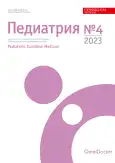Внутрипросветное удаление гамартомных полипов глубоких отделов тонкой кишки у детей
- Авторы: Королев Г.А.1, Лохматов М.М.1,2, Дьяконова Е.Ю.1, Тупыленко А.В.1, Олдаковский В.И.1, Будкина Т.Н.1, Бекин А.С.1, Яцык С.П.1
-
Учреждения:
- ФГАУ «Национальный медицинский исследовательский центр здоровья детей» Минздрава России
- ФГАОУ ВО «Первый Московский государственный медицинский университет им. И.М. Сеченова» Минздрава России (Сеченовский Университет)
- Выпуск: № 4 (2023)
- Страницы: 258-261
- Раздел: Статьи
- URL: https://bakhtiniada.ru/2658-6630/article/view/252428
- DOI: https://doi.org/10.26442/26586630.2023.4.202604
- ID: 252428
Цитировать
Полный текст
Аннотация
Обоснование. Синдром Пейтца–Егерса (СПЕ) и ювенильный полипоз (ЮП) приводят к образованию гамартомных полипов в тонкой кишке, которые являются причиной инвагинации тонкой кишки, желудочно-кишечных кровотечений и непроходимости желудочно-кишечного тракта. Полипы образуются на протяжении всей жизни, и большинство пациентов подвергаются множественным хирургическим вмешательствам.
Цель. Определить эффективность и безопасность баллонной энтероскопии (БЭ) как метода внутрипросветного малоинвазивного удаления гамартомных полипов глубоких отделов тонкой кишки у детей с СПЕ и ЮП.
Материалы и методы. Исследование выполнено на базе отделения эндоскопических исследований ФГАУ «НМИЦ здоровья детей» Минздрава России. В период с 2013 по 2022 г. на стационарном лечении находились 40 пациентов: 32 (80%) с СПЕ и 8 (20%) с ЮП. За период наблюдения провели 78 лечебно-диагностических БЭ: 70 (89%) антеградных, 8 (11%) ретроградных.
Результаты. Всего при проведении БЭ выявили 310 полипов тонкой кишки: при антеградной БЭ – 283 (91,5%, ср. – 4,1±2,59), при ретроградной БЭ – 27 (8,5%, ср. – 3,48±3,39). Всего удалено 129 полипов тонкой кишки: 119 (92,2%) при проведении антеградной БЭ и 10 (7,8%) при ретроградной. Для БЭ прогнозируется выявляемость клинически значимых полипов с чувствительностью 90,1% и специфичностью 81,7%. В послеоперационном периоде выявили 6 осложнений (7,89%). В трех случаях на контрольном ультразвуковом исследовании органов брюшной полости выявили тонко-тонкокишечный инвагинат. Клинический эффект не достигнут при ретроградной БЭ – n=2 (2,62%), антеградной БЭ – n=1 (1,31%). У двух пациентов выявили перфорацию тонкой кишки: ретроградная БЭ – n=1 (1,31%), антеградная БЭ – n=1 (1,31%). И у одного пациента во время выполнения БЭ возникло кровотечение – антеградная БЭ – n=1 (1,31%).
Заключение. БЭ является эффективным и безопасным методом внутрипросветного малоинвазивного удаления полипов тонкой кишки.
Ключевые слова
Полный текст
Открыть статью на сайте журналаОб авторах
Григорий Алексеевич Королев
ФГАУ «Национальный медицинский исследовательский центр здоровья детей» Минздрава России
Автор, ответственный за переписку.
Email: KorolevG.A@yandex.ru
ORCID iD: 0000-0001-5730-3684
врач-эндоскопист, мл. науч. сотр. отд-ния эндоскопических исследований
Россия, МоскваМаксим Михайлович Лохматов
ФГАУ «Национальный медицинский исследовательский центр здоровья детей» Минздрава России; ФГАОУ ВО «Первый Московский государственный медицинский университет им. И.М. Сеченова» Минздрава России (Сеченовский Университет)
Email: lokhmatov@mail.ru
ORCID iD: 0000-0002-8305-7592
д-р мед. наук, гл. науч. сотр., зав. отд-нием эндоскопических исследований», проф. каф. детской хирургии, урологии и уроандрологии
Россия, Москва; МоскваЕлена Юрьевна Дьяконова
ФГАУ «Национальный медицинский исследовательский центр здоровья детей» Минздрава России
Email: Doctor-help03@yandex.ru
ORCID iD: 0000-0002-8563-6002
д-р мед. наук, гл. науч. сотр., врач – детский хирург, зав. отд-нием общей и плановой хирургии
Россия, МоскваАртем Викторович Тупыленко
ФГАУ «Национальный медицинский исследовательский центр здоровья детей» Минздрава России
Email: tupylenko.av@nczd.ru
ORCID iD: 0000-0003-4299-3269
канд. мед. наук, ст. науч. сотр. отд-ния эндоскопических исследований
Россия, МоскваВладислав Игоревич Олдаковский
ФГАУ «Национальный медицинский исследовательский центр здоровья детей» Минздрава России
Email: oldakovskiy@nczd.ru
ORCID iD: 0000-0002-8805-8164
врач-эндоскопист, мл. науч. сотр. отд-ния эндоскопических исследований
Россия, МоскваТатьяна Николаевна Будкина
ФГАУ «Национальный медицинский исследовательский центр здоровья детей» Минздрава России
Email: tatyana-budkina@mail.ru
ORCID iD: 0000-0002-7379-7298
канд. мед. наук, врач-эндоскопист, ст. науч. сотр. отд-ния эндоскопических исследований
Россия, МоскваАлександр Сергеевич Бекин
ФГАУ «Национальный медицинский исследовательский центр здоровья детей» Минздрава России
Email: bekin@nczd.ru
ORCID iD: 0000-0002-5900-1812
врач – детский хирург, мл. науч. сотр. отд-ния общей и плановой хирургии
Россия, МоскваСергей Павлович Яцык
ФГАУ «Национальный медицинский исследовательский центр здоровья детей» Минздрава России
Email: makadamia@yandex.ru
ORCID iD: 0000-0001-6966-1040
чл.- кор. РАН, д-р мед. наук, проф., дир.
Россия, МоскваСписок литературы
- Weaver LT, Austin S, Cole TJ. Small intestinal length: a factor essential for gut adaptation. Gut. 1991;32(11):1321-3. doi: 10.1136/gut.32.11.1321
- Beggs AD, Latchford AR, Vasen HF, et al. Peutz-Jeghers syndrome: a systematic review and recommendations for management. Gut. 2010;59(7):975-86. doi: 10.1136/gut.2009.198499
- Singh AD, Gupta A, Mehta N, et al. Occurrence of gastric cancer in patients with juvenile polyposis syndrome: a systematic review and meta-analysis. Gastrointest Endosc. 2023;97(3):407-14.e1. doi: 10.1016/j.gie.2022.10.026
- Wagner A, Aretz S, Auranen A, et al. The Management of Peutz-Jeghers Syndrome: European Hereditary Tumour Group (EHTG) Guideline. J Clin Med. 2021;10(3):473. doi: 10.3390/jcm10030473
- Kopacova M, Tacheci I, Rejchrt S, Bures J. Peutz-Jeghers syndrome: Diagnostic and therapeutic approach. World J. Gastroenterol. 2009;15(43):5397-408. doi: 10.3748/wjg.15.5397
- Van Lier MGF, Wagner A, Mathus-Vliegen EMH, et al. High Cancer Risk in Peutz-Jeghers Syndrome: A Systematic Review and Surveillance Recommendations. Am J Gastroenterol. 2010;105(6):1258-64. doi: 10.1038/ajg.2009.725
- Latchford AR, Neale K, Phillips RK, Clark SK. Juvenile polyposis syndrome: a study of genotype, phenotype, and long-term outcome. Dis Colon Rectum. 2012;55(10):1038-43. doi: 10.1097/DCR.0b013e31826278b3
- Zhang LJ, Su Z, Liu X, et al. Peutz-Jeghers syndrome with early onset of pre-adolescent gynecomastia: a predigree case report and clinical and molecular genetic analysis. Am J Transl Res. 2017;9(5):2639-44.
- Hinds R, Philp C, Hyer W, Fell JM. Complications of childhood Peutz-Jeghers syndrome: implications for pediatric screening. J Pediatr Gastroenterol Nutr. 2004;39(2):219-20. doi: 10.1097/00005176-200408000-00027
- Yamamoto H, Sugano K. A new method of enteroscopy – the double-balloon method. Can J Gastroenterol. 2003;17(4):273-4. doi: 10.1155/2003/309532
- Li BR, Sun T, Li J, et al. Primary experience of small bowel polypectomy with balloon-assisted enteroscopy in young pediatric Peutz-Jeghers syndrome patients. Eur J Pediatr. 2020;179(4):611-7. doi: 10.1007/s00431-019-03534-1
- Blanco-Velasco G, Hernández-Mondragón OV, Blancas-Valencia JM, et al. Safety and efficacy of small bowel polypectomy using a balloon-assisted enteroscope in pediatric patients with Peutz-Jeghers syndrome. Rev Gastroenterol Mex (Engl Ed). 2018;83(3):234-7 [Article in English, Spanish]. doi: 10.1016/j.rgmx.2017.07.003
- Latchford AR, Neale K, Phillips RK, Clark SK. Peutz-Jeghers syndrome: intriguing suggestion of gastrointestinal cancer prevention from surveillance. Dis Colon Rectum. 2011;54(12):1547-51. doi: 10.1097/DCR.0b013e318233a11f
- Achatz MI, Porter CC, Brugières L, et al. Cancer Screening Recommendations and Clinical Management of Inherited Gastrointestinal Cancer Syndromes in Childhood. Clin Cancer Res. 2017;23(13): e107-14. doi: 10.1158/1078-0432.CCR-17-0790
- Goldstein SA, Hoffenberg EJ. Peutz-Jegher syndrome in childhood: need for updated recommendations? J Pediatr Gastroenterol Nutr. 2013;56(2):191-5. doi: 10.1097/MPG.0b013e318271643c
Дополнительные файлы








